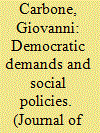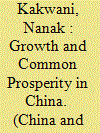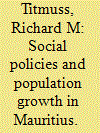| Srl | Item |
| 1 |
ID:
130052


|
|
|
|
|
| Publication |
2014.
|
| Summary/Abstract |
Social protection has become part and parcel of the development response in Southeast Asia and across the globe and is likely to gain even greater prominence in light of the post-2015 development agenda. Its set of objectives has steadily widened with social protection now expected to fulfil a plethora of functions ranging from household-level consumption smoothing to macro-level economic stabilization. Notwithstanding the many achievements of social protection to date, this paper aims to inject a healthy dose of realism into current debates about its appropriate roles. This paper particularly reflects on the productivity-enhancing and growth-inducing focus within social protection - a particularly strong feature in Southeast Asia - and how this undermines principles of inclusivity, human rights and social justice. As an antidote to this Machiavellian type of social protection, this paper argues for "Inclusive Social Protection", focusing on equitable coverage, realistic expectations and better integration of policies and programmes.
|
|
|
|
|
|
|
|
|
|
|
|
|
|
|
|
| 2 |
ID:
106964


|
|
|
|
|
| Publication |
2011.
|
| Summary/Abstract |
It is commonly assumed that the advent of democracy tends to bring about social welfare improvements. Few studies, however, have examined empirically the impact of third-wave democratisation processes on social policies in developing countries, particularly in sub-Saharan Africa. Through a diachronic comparison, this paper examines the effects of Ghana's democratisation process on the evolution of its health policy. It shows that the emergence of democratic competition played an important role in the recent adoption of a crucial health reform. A policy feedback effect on politics and a process of international policy diffusion were additional but secondary factors.
|
|
|
|
|
|
|
|
|
|
|
|
|
|
|
|
| 3 |
ID:
185083


|
|
|
|
|
| Summary/Abstract |
This paper introduces a decomposition method that quantifies the contributions to common prosperity of labor market performance and social policies and extends the idea of shared prosperity to a new measure of inequity in opportunities. The resulting common prosperity indices and opportunity equality indices are then applied to five waves of the Chinese Household Income Project data from 1988 to 2018. This paper shows that the labor market performance and social policies have been improving over the last 30 years and have helped China move towards common prosperity for everyone. The indices developed in this paper allow us to quantify the extent of shared prosperity that a country has achieved and to carry out empirical studies on which policy is working and which is not. It can also help us identify the fundamental causes of inequality and aid us in achieving equality in opportunity among all members of society.
|
|
|
|
|
|
|
|
|
|
|
|
|
|
|
|
| 4 |
ID:
097754


|
|
|
|
|
| Publication |
2010.
|
| Summary/Abstract |
Speculation about the future of the North Korean regime has been intense for nearly two decades. In the 1990s, economic crises and famine led to predictions of the Kim regime's imminent downfall. Today analysts highlight impending famine as well as threats to the regime's position brought by eroding information control. Several theories of authoritarian control help to explain how Kim Jong-il and his family have remained in power and how this might change over time. The Kim regime has employed a variety of authoritarian "tools" to protect itself both from popular revolt and from internal coups. Its social policies, reliance on certain ideas and nationalism, and use of force prevent the onset of revolution. Through numerous other tools (elite co-optation, manipulation of foreign governments for financial aid, and the "coupproofing" of domestic institutions), the regime protects itself from coups d'état and elite unrest. This framework not only helps to explain the past resilience of the regime, but it suggests that the regime is not in danger of being unseated by coups or revolution. Yet it also suggests that the regime has not adequately prepared for succession after Kim's death. This analysis has implications for policy planning about the future of the Korean Peninsula, as well as for negotiations with and coercive strategies toward Pyongyang.
|
|
|
|
|
|
|
|
|
|
|
|
|
|
|
|
| 5 |
ID:
140131


|
|
|
|
|
| Publication |
London, Frank Cass and Company Ltd., 1968.
|
| Description |
xvi, 308p.: tables, diagramshbk
|
|
|
|
|
|
|
|
|
|
|
|
Copies: C:1/I:0,R:0,Q:0
Circulation
| Accession# | Call# | Current Location | Status | Policy | Location |
| 004487 | 693/TIT 004487 | Main | On Shelf | General | |
|
|
|
|